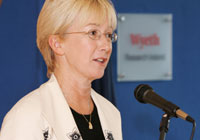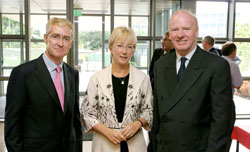Minister Hanafin welcomes UCD’s new Diabetes Research Centre
UCD selects diabetes and diabetic disease as a core research theme

Minister for Education and Science, Ms. Mary Hanafin pictured at the opening of the Wyeth Research Ireland laboratory at UCD Conway Institute
A global diabetes epidemic is underway. Latest WHO figures estimate that 177 million people suffer from diabetes worldwide. This figure is set to jump to at least 300 million by 2025.
In the Republic of Ireland alone it is estimated that up to 14% of the population over 40 years of age has diabetes and that 10% of our healthcare budget is spent treating diabetes and its complications. Every year over 2,000 people in Ireland die from diabetes-related diseases.
2003 figures show that 6,014 new cases of diabetes were recorded in Ireland that year and that 29,285 people with diabetes were admitted to hospital the same year - more than 50% of which were for diabetic complications.
In a quest to address this disease and its devastating consequences, on Thursday 31 August 2006, Dr Hugh Brady, the President of UCD announced details on a new Diabetes Research Centre at UCD to provide a multidisciplinary collaborative research matrix in which discoveries relating to the condition will be rapidly translated from bench to bedside.
Having made a number of important breakthroughs in the area of diabetes and diabetic disease over recent years, UCD has selected the area as one of its core research themes. The university has internationally recognised expertise in diabetic kidney disease (diabetic nephropathy), diabetic eye disease (diabetic retinopathy), diet and diabetes (diabesity), quality of life, and clinical and genetic epidemiology of diabetes.
On a visit to UCD Conway Institute for the opening of Wyeth Research Ireland - a €13 million Protein Discovery & Optimization Laboratory - the Minister for Education and Science, Mary Hanafin welcomed UCD’s commitment to create a global centre of excellence in diabetes research which will build on existing expertise at UCD and facilitate collaboration with hospitals, universities and pharmas in Ireland.

Dr. Hugh Brady, President of UCD, Ms. Mary Hanafin, Minister for Education and Science and Dr Frank Walsh, Executive VP, Discovery Research Worldwide for Wyeth
‘Guided by an international advisory board of experts from leading centres in Europe and the US and working together with our national and international network of collaborators in academia and industry, the Centre will work towards discoveries to prevent, treat and cure diabetes and its complications’ commented Dr Hugh Brady, President of UCD.
‘Diabetes and its complications consume 10% of our healthcare budget nationally and cause inestimable human suffering. Through integrated approaches from molecular to epidemiological studies the potential impact and benefits of the UCD Diabetes Research Centre are unprecedented,’ Dr Brady continued.
The UCD Diabetes Research Centre provides open access between researchers and clinicians from across its schools, teaching hospitals and the Dublin Molecular Medicine Centre. It also coordinates and collaborates on research programmes with investigators at The Royal College of Surgeons in Ireland, Beaumont Hospital, Belfast City Hospital, Cork University Hospital, Cork University Hospital and University Hospital Galway, Queens University Belfast, NUI Galway and UCC together with researchers in Europe, the Americas, multinational pharma and Irish biotech companies.
Diabetes:
Diabetes occurs when the body is no longer able to properly regulate the amount of sugar (glucose) that is in the blood. Due to a defect in the pancreas, the gland that produces insulin, the body can’t properly burn-up carbohydrates and the levels of sugar in the blood become too high. It is a lifelong condition with relative high risks of developing serious medical complications over time including eye disease (diabetic retinopathy), kidney disease (diabetic nephropathy), nerve damage (diabetic neuropathy), heart disease and strokes.
All types of people are at risk from diabetes. However, there are several risk factors associated with the condition including: a family history of diabetes; obesity (80% of people with diabetes are overweight); older age (the chance of developing diabetes increases with age); limited physical exercise; women who had the condition during pregnancy or women who had a large baby.
Around 90% of all diabetics in Ireland suffer from a type of diabetes which was traditionally associated with older people, but is now increasingly common in younger people. This type of diabetes, called Type 2 diabetes, is hard to detect because the breakdown in the regulation of glucose in the body occurs gradually over a period of many years. People with Type 2 diabetes often only present to their doctor when they have serious complications.
The UCD Diabetes Research Centre will provide a multidisciplinary collaborative research matrix in which discoveries will be rapidly translated from bench to bedside, and vice versa in our quest to address this disease and its devastating consequences.
